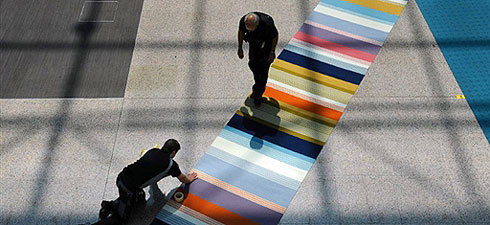Just a few months before he was elected Swedish prime minister in 2006, Fredrik Reinfeldt showed a flagrant disregard for the global warming debate. Then, only a few weeks later, after moving into Rosenbad [seat of Swedish government in Stockholm], he suddenly became a fervent champion of the climate cause. In the interim he had grasped that he had an ace in the hole to play at the Copenhagen climate summit this December, where a new treaty is to be negotiated to supersede the Kyoto Protocol.
Nobody talks about climate anymore
Fredrik Reinfeldt is ready. He did not even wait for Sweden to take over the European helm from the Czech Republic on 1 July to meet with world leaders like Chinese president Hu Jintao, US presidents George Bush and Barack Obama, and Brazil’s Lula.
But now the situation has changed – utterly. "Nobody’s talking about the climate any more,” he observes. The financial crisis has usurped its place centre-stage in debates, thereby conferring on his finance minister, Anders Borg, a pivotal role. As to climate, well, we are simply going to have scale back our expectations for the time being. The European Union is divided, and pockets of resistance have cropped up in the south and east of Europe.
Fredrik Reinfeldt’s presidency comes during one of the most volatile periods in EU history: freshly-elected MEPs are trying to get their bearings, commissioners won’t be appointed before autumn, and the much-heralded renewal of the EU institutions has been put on ice till the second Irish referendum on the Lisbon Treaty in October.
You do what you can
Still and all, it does seem more the rule than the exception for the presiding country to inherit a major crisis to cope with: witness France, heir to the financial crisis and the Russian invasion of Georgia, or the Czech Republic taking over during the war in Gaza. It appears more and more unlikely that Sweden will be able to play a decisive part in shaping the successor to the Kyoto Protocol. Instead it will have to focus on what is actually doable.
The next six months are liable to make or break Fredrik Reinfeldt and his coalition government. The setting is auspicious for the Moderates [Fredrik Reinfeldt’s party], who are now bigger and stronger than their three coalition partners put together, with a little over a year to go till the next elections in 2010. But as they loom, he will have to answer for his 2006 pledge to provide “work instead of welfare cheques”. At the time he promised to put a stop to "exclusion", that being the new name for unemployment. When the right wing came to power, the jobless rate was 6%. In the wake of the financial crisis, we are now expecting unemployment to hit 11–12% in 2010–2011. The situation is particularly critical among 16–24-year-olds, 25% of whom are currently out of work. Concomitantly, the number of those on “economic aid” – to use the latest euphemism for the dole – in the first quarter of 2009 was up 17% on the same period last year.
But Fredrik Reinfeldt and Anders Borg are convinced the Swedish electorate will understand they can’t blame the government for a worldwide crisis: "We’re working on managing the crisis, and the Swedish people understand that,” the prime minister has declared.
Was this article useful? If so we are delighted!
It is freely available because we believe that the right to free and independent information is essential for democracy. But this right is not guaranteed forever, and independence comes at a cost. We need your support in order to continue publishing independent, multilingual news for all Europeans.
Discover our subscription offers and their exclusive benefits and become a member of our community now!












